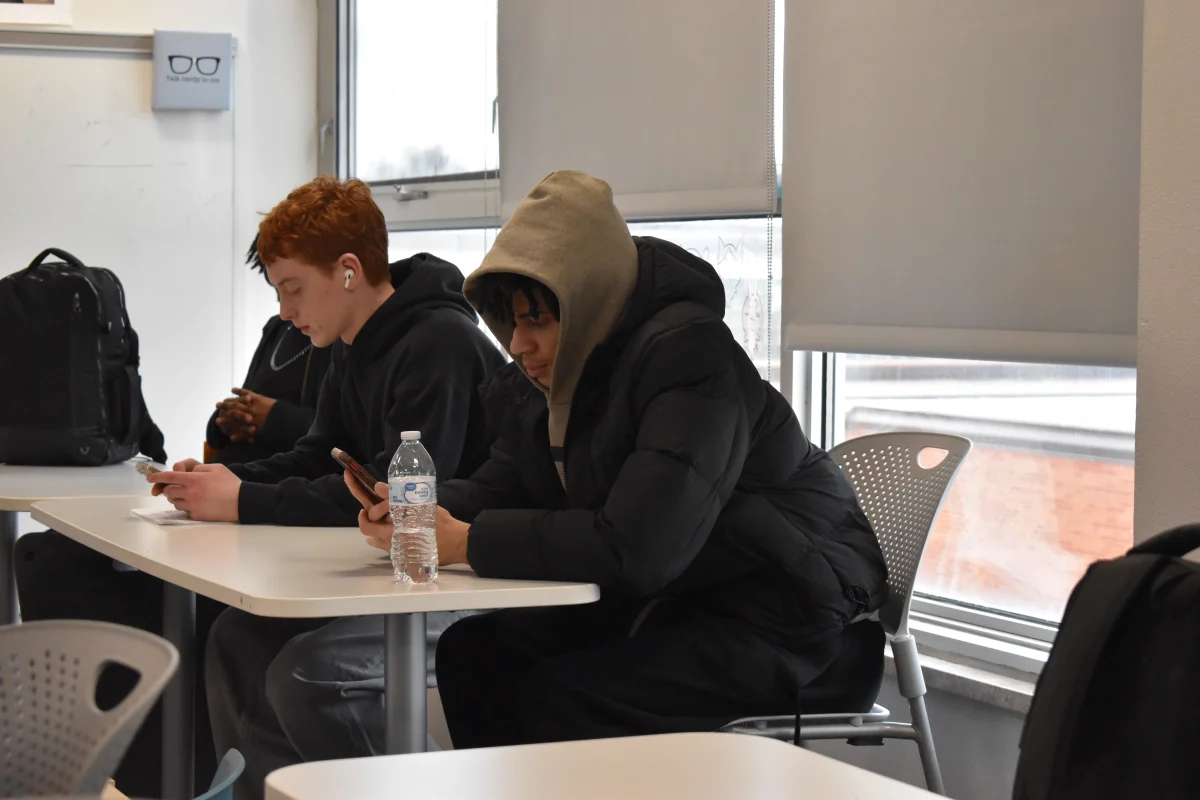
Alyssa Johannes
Senior Drevon Gillard and junior Brennan Healy use their phones during class Feb. 24. Park's cell phone policy works to limit distraction in classrooms through restricting phone usage.
This year, Park introduced a new cell phone policy in an attempt to limit student use and distraction in the classroom. The policy was created following the state bill dictating that every school district in Minnesota needed a phone policy by March 15, 2025. It was the first time in years that they have had strict guidelines and a step-by-step procedure to get rid of phones. After a semester with this change in policy, students and staff have mixed different viewpoints on it.
Junior Maggie Tight said whether there is a strong policy in place or not, students will still be attracted to their phones. She said if a student is distracted by their phone, often they won’t pay attention without it either.
“No matter what the policy is, students are gonna get away with going on their phones,” Tight said. “The kid that really doesn’t care enough to pay attention in class, they won’t.”
Math teacher Anson Opara said that the policy either needs to be something Park doesn’t enforce or something they enforce hard. According to Opara, nothing has changed significantly this semester.
“I don’t know if it’s really changed a lot. We’re kind of at a crossroads, where either we gotta allow phones all the time or mandate it where the school takes a hard stance like a policy,” Opara said. “I don’t think we can do a thing where a kid has a phone in his pocket. It’s too much of a distraction.”
According to geometry teacher Keisha Piehl, she has always supported a cell phone policy, as she is strict with them in her class. She said she has heard the policy has been going well in other classes.
“I supported it. I’ve always had a pretty strict rule that students aren’t allowed to use cell phones in my class,” Piehl said. “I have only heard good things. It sounds like it’s going okay. It’s pretty consistent between classrooms from what I’ve heard.”
Opara said the policy started off well, but then students tried to go against it. He said it became too much for teachers to enforce and teach.
“It’s been a slow attrition, it started out really good and then kids tested the policy and then they started to defy it. Then it got to a point where it just can’t hold all of the water at the same time,” Opara said. “A teacher can’t teach, control a room (and) worry about all the different things at one time.”
Tight said some teachers have let loose with the policy, but some teachers are trying to crack down on phones. She said she would change the policy to allow teachers to choose their own rules.
“There are a lot of teachers who kind of let kids get away with (phones), but I think the teachers who are really trying to enforce it do a good job,” Tight said. “It should be up to the teachers like it was last year because if you’re not doing anything in class, the student doesn’t have anything to do.”
Piehl said she wouldn’t add anything to the policy right now. According to her, adding things like phone pouches or other methods to prevent phone usage would be extra work for something that has been working for her.
“I like how students are able to check their phones during passing periods and then put them away during class,” Piehl said. “I would support other strategies but (the current policy is) working for me right now without phone pouches. I might not want to add the hassle.”
